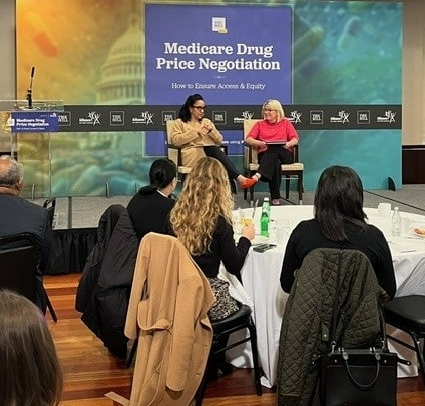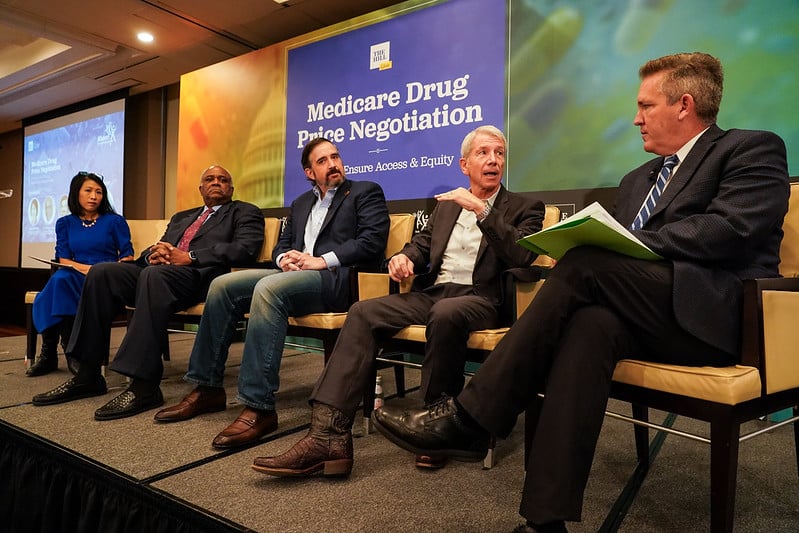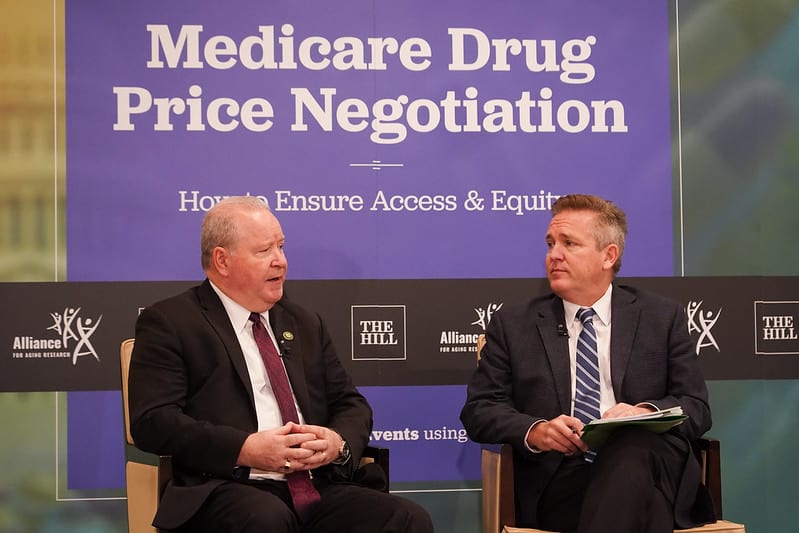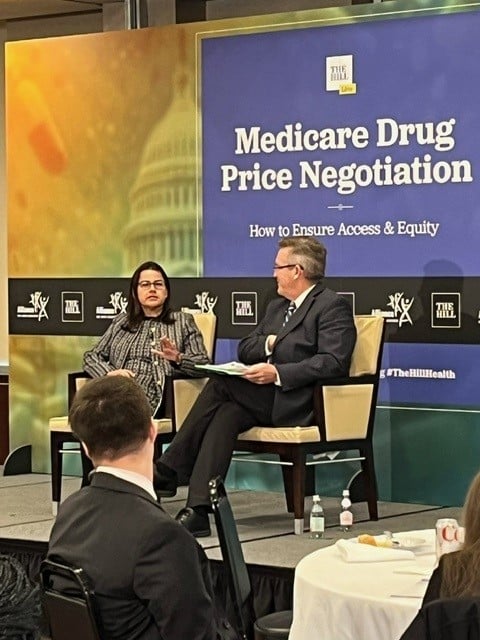Access & Equity Take Center Stage at Alliance Event
Published December 14, 2023
There are many unknows as the Medicare program for the first time attempts to negotiate prices for select prescription drugs. Policymakers, patient advocates, providers, and academics gathered December 13 mere yards from Capitol Hill to discuss concern over access and equity issues related to prescription drugs under Medicare Price Negotiation.
Produced in partnership with The Hill, “Medicare Drug Price Negotiation: How to Ensure Access & Equity” tackled the intricacies of the 2022 Inflation Reduction Act and the looming drug price negotiation for Part D and Part B drugs.
The program opened with a sponsor perspective presented by the Alliance. Alliance President & CEO Sue Peschin, MHS, sat down with Dr. Sara D. Collins, an Interventional Cardiologist and Co-Chair, Health and Policy Committee, Association of Black Cardiologists. Dr. Collins explained how utilization management paradigms such as preauthorization can affect medical practices like hers, with the burden often falling on medical assistants.

“Utilization management complicates our ability to prescribe these medications and puts our patients in a precarious position as a result,” Collins said. “The prior-authorization process is not straight forward either. So, you would think that when we prescribe the medication, you go to the pharmacy, pick it up, it’s a done deal. But when utilization management techniques like prior authorization…are instituted, the person at the practice assigned this responsibility – usually a very busy medical assistant whose typically being paid minimum wage or a biller at larger practices – that takes the responsibility of prescribing out of our hands and places it on our support staff.”

A panel discussion moderated by Bob Cusak, Editor in Chief of The Hill, followed, featuring the following:
- Craig Garthwaite, Director of Healthcare, Kellogg School of Management, Northwestern University
Melissa Mitchell, Executive Director, Global Coalition on Aging - Gary A. Puckrein, President & CEO, National Minority Quality Forum
- Kurt Schrader, Principal, Williams & Jensen & Former U.S. Representative (D-OR)
A few highlights:
- Schrader: “It’s going to be an exciting 2 years to see how things play out. For seniors, I like to think that the glass is a little more than half full because out-of-pocket costs will indeed be capped at $2,000…but as aluded to in the earlier panel, access to some of the medications could be severely restricted depending on how the price negotiations go.”
- Garthwaite: “The politics of DC are such that things that are pain 20-30 years from now are easy things to pass…and that’s what we’re seeing form the current administration and the spores of the IRA.”
- Puckrein: “When you’re rationing you’re necessarily going to produce inequities because you’re picking winners and losers in the system. IRA has a great opportunity to exacerbate that problem and that’s what we’re deeply concerned about. There’s nothing in IRA that actually deals with equity and we have to get equity in our healthcare system and that means we need to challenge the rationing that’s going on.”
- Mitchell: “We need to look at the impact on innovation and access overall. We see that in Europe that in some cases that having similar price controls led to a particular cancer drug reaching the market 240 days later than it did in the U.S. and that had a cost to upwards of 30,000 life years. We need to make sure we are looking at this through an equitable lens. And we need to make sure in the long-term we can’t stifle innovation overall. This has ultimate market impacts of how it’s going to impact individuals and communities.”

In the first headliner interview, Cusak spoke with Rep. Larry Bucshon (R-IN), Vice Chair, House Energy and Commerce Subcommittee on Health, and focused on patients and providers.
Bucshon: “We clearly have disparities across the country that need to be addressed. As reimbursement doesn’t keep – which it hasn’t – you’re going to see less access in [rural and underserved urban America].”

The second headliner interview focused on addressing barriers, featured Rep. Nanette Barragán (D-CA), Member, House Energy and Commerce Subcommittee on Health.
Barragán: “For us it’s a matter of making sure this is done quickly and on time, making sure it’s drugs that people are using, that’s going to benefit the greatest good. Access to care is the biggest concern we hear about…so that’s going to be an important thing.”
Related News Coverage:
